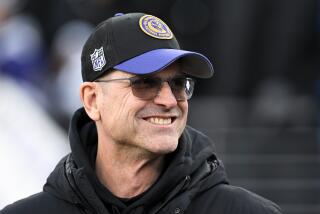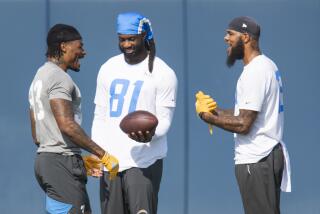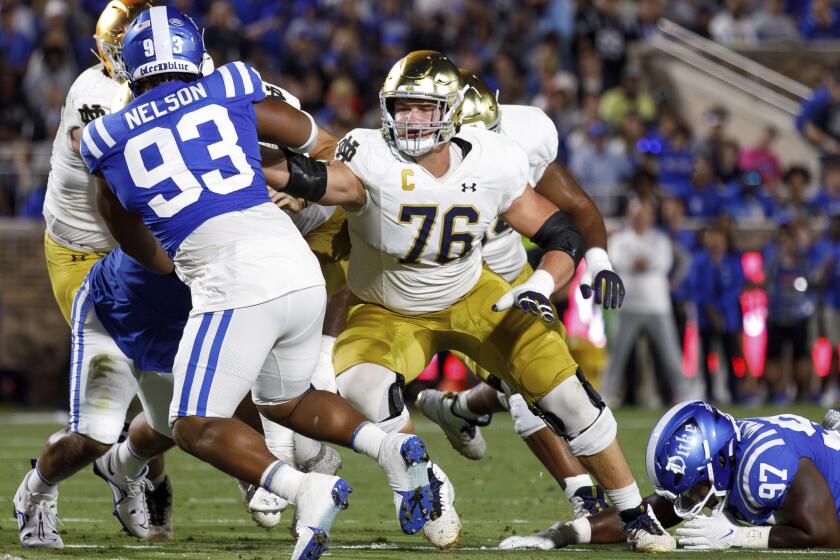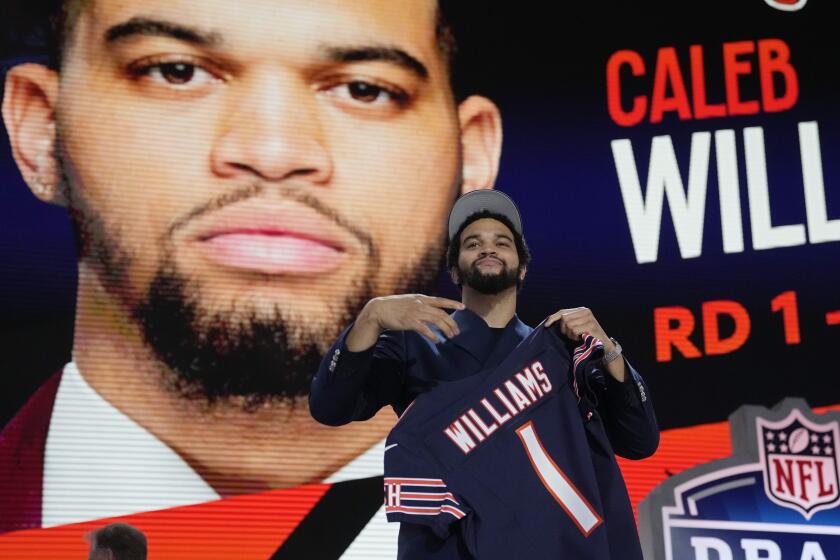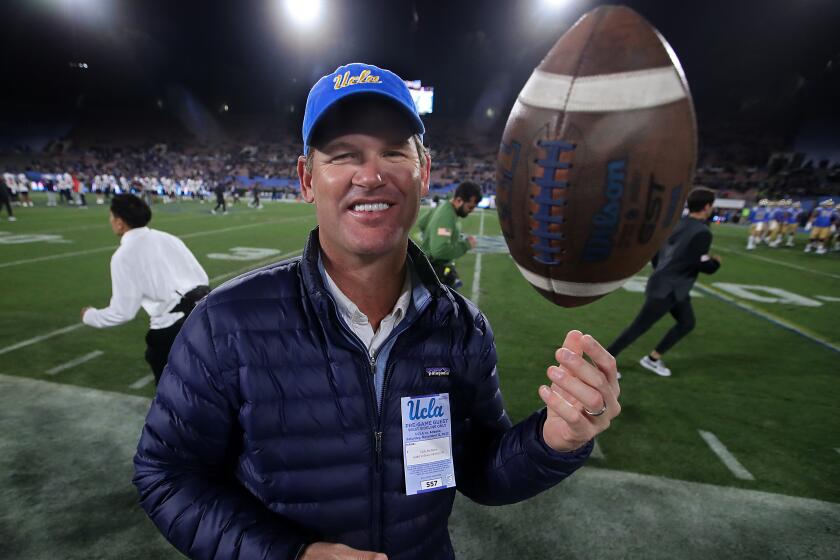Melvin Gordon is happy that his father, and biggest supporter, is out of prison
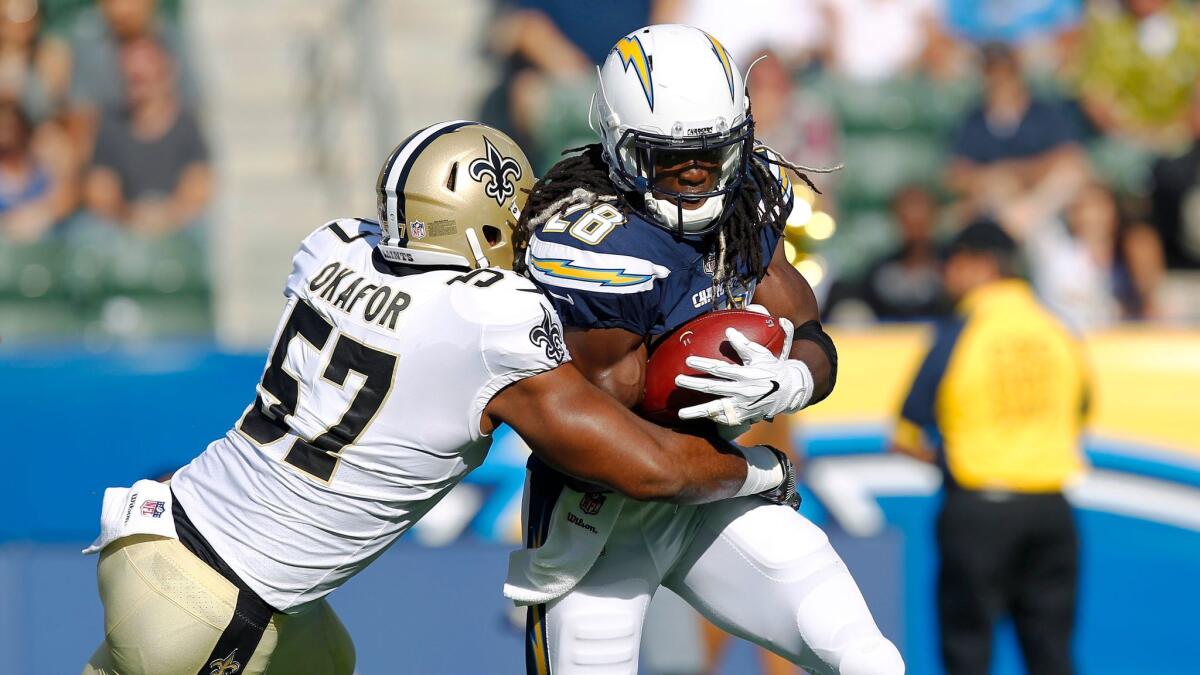
There is not a hint of anger in Melvin Gordon’s voice or condemnation in his words, only gratitude for a father who “kept food on the table for me and my mom and kept a roof over our heads,” the Chargers running back says.
That his father provided for the family by selling cocaine, which led to a drug-trafficking charge and a five-year stint in federal prison, has remarkably left Gordon neither conflicted nor confused.
“You know what? Everyone makes mistakes; no one in this world is perfect,” Gordon, 24, said. “The quicker you understand that, the faster you forgive.
“Some people are put in positions of making decisions they need to make for their family to survive. As a kid, you understand that. But I’m in a position now where he doesn’t have to make bad decisions anymore.”
Gordon — a 6-foot-1, 215-pound bundle of brute strength, breakaway speed and long, flowing dreadlocks — was a 2014 Heisman Trophy finalist at Wisconsin, racking up 4,915 yards rushing and 49 touchdowns in four seasons and setting a then-NCAA record with 408 yards rushing against Nebraska.
A first-round pick of the Chargers in 2015, Gordon struggled as a rookie, rushing for 641 yards with no touchdowns and six fumbles before emerging as one of the NFL’s most promising young backs in 2016, rushing 254 times for 997 yards and 10 touchdowns and catching 41 passes for 419 yards and two touchdowns.
Gordon’s father, who is also named Melvin but goes by “Big Bo,” was instrumental in Gordon’s development as a football player.
When Gordon was barely old enough to snap chinstrap to helmet, Big Bo would rummage through garbage cans for empty water bottles and set them up as cones in a park near their house. Gordon zigzagged through the agility course, working on cuts and bursts.
Bo set up a weight room in the basement of their Kenosha, Wis., home and monitored Gordon’s strength and conditioning program through high school. Bo dissected video of NFL greats with Gordon, stressing the elusiveness of Barry Sanders and toughness of Walter Payton.
Bo attended every one of Gordon’s prep games, sprinting down the sideline with his son on many of the 38 touchdowns Gordon scored as a senior at Kenosha’s Bradford High.
“He was a huge influence on my football career, my mom too,” Gordon said, referring to Carmen Gordon, who remains married to Bo. “They never missed a game, man. They were very supportive. My dad was like my workout partner. He definitely taught me a lot of stuff. He’s been there every step of the way.”
Until he wasn’t.
In March 2012, when Gordon was a 19-year-old redshirt freshman at Wisconsin, Bo was sentenced to 10 years in prison for his role in a northern Illinois cocaine-dealing ring and a concurrent three-year sentence for drug dealing in Kenosha County.
The longer sentence was reduced twice, and Bo — who served time in federal correctional institutions in Pekin, Ill., Duluth, Minn., and Elkton, Ohio — was released last December.
Gordon asked that his parents, who attended most of the Chargers’ training-camp workouts in Costa Mesa in August, not be interviewed for this story.
Speaking to Bleacher Report last fall, Carmen Gordon, 49, said federal authorities began investigating Bo when Melvin was in junior high school and that Bo was a “manager” in the drug ring.
“He wasn’t a typical drug dealer,” Carmen told the website. “He moved big, big weight.”
Gordon, the only child of Bo and Carmen, didn’t know the particulars of Bo’s business but was aware of his involvement, no matter how well Bo separated drug-dealing from fatherhood.
“It was not a secret,” Gordon said. “You kind of know everything that’s going on. But he was a good father. He did what he needed to do. He made me breakfast every morning. He made sure I never went to sleep hungry.”
Any anger or resentment Gordon felt about his father’s prison sentence was channeled into the weight room, film room and onto the field. Gordon developed a reputation as a workout fiend at Wisconsin.
“It just gave me motivation,” said Gordon, who stayed in contact with Bo through regular emails and occasional prison visits. “It was hard to run the household and take care of my mom when I was in college, but I wanted to be in a position to be able to take care of them when I got done with school.”
The four-year, $10.7-million rookie contract Gordon signed with the Chargers eased the financial burden on his family, and Bo’s release from prison restored the household.
For the first time since Gordon’s first season at Wisconsin in 2011, Bo watched his son play in person when the Chargers faced Seattle in the Aug. 13 preseason opener at StubHub Center. Bo plans to attend every home game this season.
“It means a lot to have him back here watching practice, watching me play on game day,” Gordon said. “I know it’s something he missed for a while. To have him back is a beautiful thing.”
Bo always encouraged his son “to be the best running back ever.” The first step toward greatness would be a 1,000-yard season, a threshold Gordon — who missed the final three games of 2016 because of knee and hip injuries — fell three yards short of last season.
“That was a big goal of mine,” Gordon said. “To be that close and to fall short, you think about so many runs where you got tripped up on … honestly, three yards? I’m gonna look back when I’m done and be highly upset.”
Gordon caught only 22 passes for 228 yards in four college seasons, which wasn’t necessarily an indictment of his pass-catching skills.
“We had pass plays at Wisconsin,” Gordon said, “but when you’re busting off 60-yard touchdowns rushing, why pass the ball?”
Any concerns the Chargers had about Gordon’s hands coming out of college were quickly put to rest.
“He’s had some big gains in the passing game, whether it was a check-down or a design screen to him or moving across the middle and catching the ball,” offensive coordinator Ken Whisenhunt said. “He has talent in that area … and that’s a great asset for Melvin.”
Alfredo Roberts, the Chargers’ first-year running backs coach, is a former tight end who was a Dallas Cowboys teammate of Emmitt Smith, the NFL’s all-time leading rusher, in 1991-92.
Roberts said Gordon is bigger and faster than Smith, and catches the ball as well as Smith. He has been especially impressed with Gordon’s speed and athleticism and said he’s “in awe” of how well Gordon moves in space.
“Emmitt is in the Hall of Fame, and the cement is still wet on Melvin,” said Roberts, a former Jacksonville, Cleveland, Tampa Bay and Indianapolis assistant. “We’ll see what his body of work is, but I think he’s gonna have a great season.”
If not, it won’t be for lack of effort. After his subpar rookie year, Gordon sought out star running back Adrian Peterson — whom he did not know — for advice, because “he’s one of the best to do it, and I need to learn from someone like that while I can,” Gordon said.
Gordon has spent several weeks during the last two offseasons training in Houston with Peterson, who ranks 16th on the NFL’s all-time rushing list.
“From the outside looking in, you’re never sure about a guy’s temperament, his work ethic, his habits, how good he really wants to be,” Roberts said. “From day one, Melvin looked me in the eye and said, ‘I want to be the best — not just good, but great — and I want to work on it.’
“He has all the tools. He can run, catch, he’s big enough to protect, and he has the want-to. He’s conscientious, he’s a great teammate, and he’s still growing.”
More to Read
Go beyond the scoreboard
Get the latest on L.A.'s teams in the daily Sports Report newsletter.
You may occasionally receive promotional content from the Los Angeles Times.

